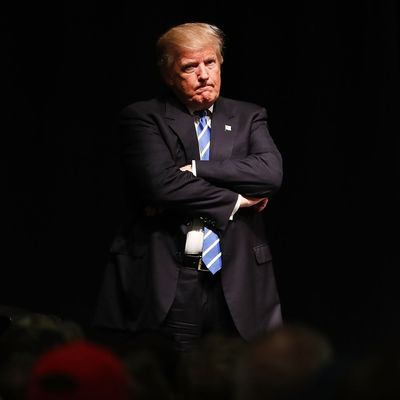
Donald Trump’s campaign is signaling that its new, post-first-debate message will be an attack on Hillary Clinton’s finances, under the catchphrase “Follow the money.” This is probably Trump’s most fruitful avenue of attack. The Clinton Foundation has created appearances of a conflict of interest, and the Clintons’ policy of accepting speaking fees from any source as long as the check would clear the bank has tarnished her image, and months of bashing at the hands of Bernie Sanders left her branded in the mind of many young liberals as a handmaiden of Wall Street.
And yet the notion that a voter ought to support Trump over Clinton on grounds of financial ethics or transparency is insane. Trump is corrupt on a world-historic scale. Andrew Prokop’s summary merely skims the surface of a career that has left hardly any rule or norm of business conduct un-violated. It is not only Trump’s history of misconduct, or even his ongoing abuse of his foundation for personal gain, but his astonishing promise, if elected, to continue to abuse his power to enrich himself by having his children manage his branded business that he will enhance via public office.
Even if none of that were true, it remains the case that Trump has shattered modern precedent by refusing to disclose his tax returns. How on Earth can a candidate run on the slogan “Follow the money” while stonewalling any questions about his own money? The only possible context in which this makes sense is a myopic, context-free focus on Clinton’s ethical shortcomings, combined with the assumption that Trump’s dangerous lunacy amounts to some kind of independence from big moneyed interests.
That the latter is not the case is a point Clinton ought to press more forcefully. A Gallup poll finds that, for voters under 35 years old, the only issue on which Trump beats Clinton is “government regulation of Wall Street and banks.” This is an understandable heuristic based on a combination of Clinton’s paid speeches to Goldman Sachs, Sanders positioning himself to her left on financial regulation, and the uncertainty with which Wall Street views Trump.
But the reality is that Clinton favors strengthening the already-tough regulations on Wall Street created by Dodd-Frank, by levying a risk fee on the largest banks and tightening the Volcker Rule. Trump, on the other hand, proposes “close to dismantling of Dodd-Frank,” which, he claims, “has made it impossible for bankers to function.” This is a conventional Republican policy agenda strongly endorsed by Wall Street. Now, it is true that Wall Street does not like Trump, but this is not because he would regulate their activity, but because he is a dangerous buffoon who might bring down the world economy and them with it.
Clinton had the opportunity to draw this distinction in the first debate, after her opponent boasted of his opposition to regulation. She declined to point out that the regulations Trump would eviscerate include those on the financial industry. It is an opportunity she ought to seize the next time it comes.






























